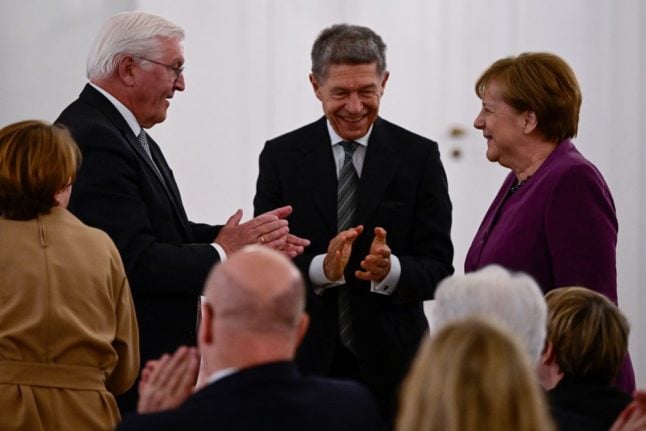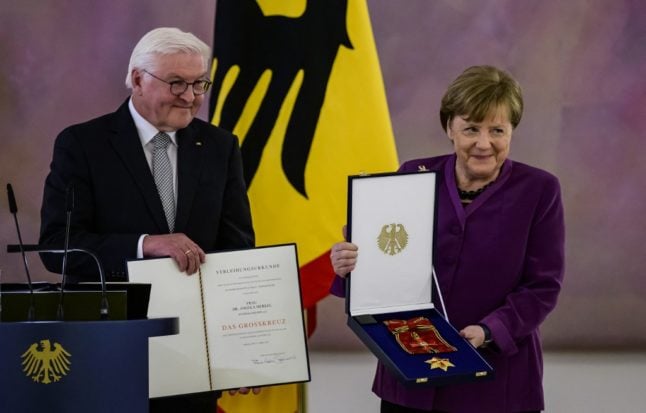Merkel, who led Europe’s biggest economy from 2005 to 2021, was presented with the special class Grand Cross by President Frank-Walter Steinmeier on Monday evening.
The longtime leader thanked her family and several former aides for supporting her through her years in power, recalling “many very, very good experiences”.
“People often say what a snake pit politics is. I may say that I would not have survived if it were not for the other side of politics, and that is why I have always been able to enjoy it,” she said.
In a speech before handing over the award, Steinmeier praised Merkel’s “extraordinarily long time in office and… extraordinary political life”.
“For 16 years you served Germany with ambition, with wisdom, with passion,” he said.
Guests at the ceremony included Chancellor Olaf Scholz, European Commission chief Ursula von der Leyen and Merkel’s husband, Joachim Sauer.
The special class Grand Cross has been handed out only twice before, to former chancellors Konrad Adenauer and Helmut Kohl.
READ ALSO: Merkel says no regrets over Germany’s Russia gas deals
Ukraine crisis
Though hugely popular through most of her time in power, Merkel, 68, has seen her star fade since she retired in December 2021.
The long-time leader has in particular faced criticism of her policy towards Russian President Vladimir Putin and for leaving Germany dependent on Russian energy — a weakness laid bare by the war in Ukraine.
“At the end of her time in office, our country was not in good shape,” Bijan Djir-Sarai of the pro-business FDP party told the RND broadcaster.

Steinmeier, who served as foreign minister twice under Merkel, has also faced criticism for his stance on Russia.
He said Moscow’s invasion of Ukraine had “not only changed Europe (but) changed the world and thus also our view of previous German and European politics”.
“It is important that we learn our lessons from this,” he said.
Some commentators have questioned the logic of Merkel receiving the award from Steinmeier.
“She is being honoured by a man whose political role is far less significant than Merkel’s,” said Der Spiegel magazine.
READ ALSO: What do Germans think of Merkel a year after her departure?
‘Great merit’
Merkel has also been criticised for her decisions in 2011 to exit nuclear power and in 2015 to welcome hundreds of thousands of refugees from Syria and Iraq.
The former chancellor had “great merits, particularly at an international level”, Carsten Linnemann, vice-president of Merkel’s own conservative CDU party, told the NTV news channel.
But she “also made mistakes, some of them glaring,” he said.
The nuclear exit, agreed after the Fukushima disaster, was “a mistake” because it was decided “without establishing how we were going to supply ourselves with energy in a reasonably self-sufficient way”, Linnemann said.
Errors had also been made with regard to the decision to leave Germany’s borders open in 2015, he said.
But Merkel, who has been writing her memoirs since she retired, has also continued to win praise, even from her Social Democrat (SPD) and Greens rivals.
READ ALSO: Merkel receives UNESCO peace prize for welcoming refugees
“I particularly appreciated her diplomatic skill and empathetic wisdom, thanks to which she always succeeded in forging viable coalitions and compromises on the national and international stage,” SPD co-leader Saskia Esken told RND.
Greens leader Omid Nouripour said Merkel had “shaped our country with her chancellorship like few others”.
“You do not have to agree with everything she did to recognise her great merits,” he said.
Steinmeier praised her hand in strengthening Germany’s economy.
“We can look back on 16 years of almost uninterrupted economic growth, during which the scourge of unemployment increasingly lost its horror for most Germans,” he said.




 Please whitelist us to continue reading.
Please whitelist us to continue reading.
Member comments